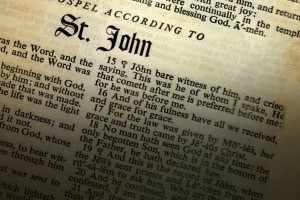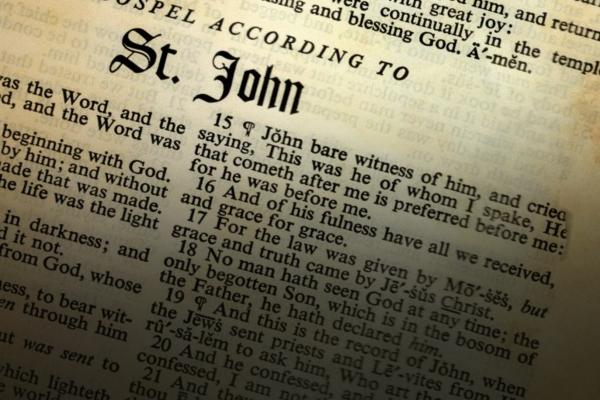 A fellow Christian Case Maker I met at Frank Turek’s CrossExamined Academy is teaching a church group about the reliability of the New Testament. A question was raised about the Apostle John: “How could John, an uneducated fisherman, have written such a literate and theologically rich gospel account?” After all, John was just a fisherman; was he educated enough to accomplish something this sophisticated? Irenaeus, certainly thought so. This historic Bishop of Lugdunum, was the student of Polycarp and Ignatius (two men who were taught directly by the Apostle John). Irenaeus identified the Apostle John as the author of the fourth Gospel, reflecting the historic understanding of the earliest Christians. In spite of this, many skeptics are eager to dismiss the authorship of John (often in an attempt to further discredit the supernatural New Testament claims related to Jesus) by doubting John’s level of education and degree of literacy. There are, however several good reasons to resist the notion that John, the son of Zebedee, was too illiterate to have written the fourth Gospel:
A fellow Christian Case Maker I met at Frank Turek’s CrossExamined Academy is teaching a church group about the reliability of the New Testament. A question was raised about the Apostle John: “How could John, an uneducated fisherman, have written such a literate and theologically rich gospel account?” After all, John was just a fisherman; was he educated enough to accomplish something this sophisticated? Irenaeus, certainly thought so. This historic Bishop of Lugdunum, was the student of Polycarp and Ignatius (two men who were taught directly by the Apostle John). Irenaeus identified the Apostle John as the author of the fourth Gospel, reflecting the historic understanding of the earliest Christians. In spite of this, many skeptics are eager to dismiss the authorship of John (often in an attempt to further discredit the supernatural New Testament claims related to Jesus) by doubting John’s level of education and degree of literacy. There are, however several good reasons to resist the notion that John, the son of Zebedee, was too illiterate to have written the fourth Gospel:
John May Have Been Educated After All
Don’t be too quick to dismiss John as uneducated. Hebrew children were required to memorize the first five books of Torah before they were twelve years old. Young students were also required to discuss these texts and write them. There is good reason to believe John and James were not exempt from this requirement. In fact, the internal evidence from the Gospel suggests John and James were more than familiar with the rabbis and Jewish teachers of their day. Take, for example, this description of Jesus’ arrest and arrival at the residence of Annas (the father-in-law of Caiaphas, the high priest):
John 18:15-16
Simon Peter was following Jesus, and so was another disciple. Now that disciple was known to the high priest, and entered with Jesus into the court of the high priest, but Peter was standing at the door outside. So the other disciple, who was known to the high priest, went out and spoke to the doorkeeper, and brought Peter in.
This “other disciple” is none other than John, the son of Zebedee, and he is described as someone who was well known to the high priest. In fact, he was known adequately enough to gain admission for himself and Peter. Interestingly, while Peter was here in Anna’s courtyard, he was identified by his simple Galilean accent (see Luke 22:59). No one ever identified John in this way, however. John may have been a fisherman, but this doesn’t mean he was necessarily uneducated or unsophisticated. Paul was also quick to identify himself as a tent-maker, but obviously had access to a good education.
John May Have Employed a Scribe
But even if John was under-educated, this does not preclude the reasonable use of a scribe. An assistant of this nature (known as an “amanuensis”) was commonplace at this point in history. Paul repeatedly used a scribe to help him as he dictated his letters to the Church. Tertius helped Paul write the letter to the Romans (Romans 16:22), and Paul admitted using a scribe to help him with 1 Corinthians (1 Corinthians 16:21). If John wrote his Gospel and letters in a similar manner, it is reasonable to infer his use of a scribe. If this was the case, the degree of Greek sophistication would be attributed to the scribe rather than to John. When skeptics point to differences in the form of Greek seen in some of John’s writings (when compared with one another), they most certainly are ignoring the use of an “amanuensis”.
John May Have Grown Into A Wise Author
Finally, we must also resist the temptation to deny John the theological sophistication necessary to write (or dictate) the Gospel. John spent three years with Jesus, and would reasonably have grown in his understanding of God’s nature and his ability to articulate this to others. John’s Gospel is the last of four accounts of Jesus’ life; it clearly demonstrates the benefit of time and reflection. John may have been a fisherman, but this doesn’t mean he could not have grown, over many years, into a multi-lingual, thoughtful, articulate spokesperson for the early Christian movement. As I reflect on my own life and growth as a Christian (and especially as I re-read many of my earliest writings on Christianity), I am often embarrassed by my early naiveté related to many Christian concepts. I’ve come a long way in a short period of time. John must certainly have grown similarly. He didn’t pen his texts immediately, but wrote them instead as a wise, reflective elder statesman.
Attacks on the educational level of John are aimed at discrediting him as the author of his Gospel. But the students of the Apostles accepted John’s authorship and the attribution continued through the Church Fathers. Share on X
Attacks on the educational level of John are aimed at discrediting him as the author of his Gospel. But the earliest students of the Apostles accepted John’s authorship and the historic attribution continued through the Church Fathers. In addition to this, there is good internal evidence to suggest the author of John’s Gospel was very familiar with the culture, geography, and political conditions surrounding the life of Jesus. The author was clearly part of Jesus’ inner circle and is likely the disciple who, at the Last Supper, laid his head on Jesus’ breast. There is more than enough historical and circumstantial evidence to infer the Apostle John as the author of the fourth Gospel, in spite of the fact he may have begun his career as a simple fisherman.
 For more information about the reliability of the New Testament gospels and the case for Christianity, please read Cold-Case Christianity: A Homicide Detective Investigates the Claims of the Gospels. This book teaches readers ten principles of cold-case investigations and applies these strategies to investigate the claims of the gospel authors. The book is accompanied by an eight-session Cold-Case Christianity DVD Set (and Participant’s Guide) to help individuals or small groups examine the evidence and make the case.
For more information about the reliability of the New Testament gospels and the case for Christianity, please read Cold-Case Christianity: A Homicide Detective Investigates the Claims of the Gospels. This book teaches readers ten principles of cold-case investigations and applies these strategies to investigate the claims of the gospel authors. The book is accompanied by an eight-session Cold-Case Christianity DVD Set (and Participant’s Guide) to help individuals or small groups examine the evidence and make the case.
J. Warner Wallace is a Dateline featured Cold-Case Detective, Senior Fellow at the Colson Center for Christian Worldview, Adj. Professor of Christian Apologetics at Talbot School of Theology, Biola University, author of Cold-Case Christianity, God’s Crime Scene, and Forensic Faith, and creator of the Case Makers Academy for kids.
Subscribe to J. Warner’s Daily Email
























Pingback: How Could John, a Poor, Uneducated Fisherman, Write the Gospel of John? | THINKAPOLOGETICS.COM
Pingback: How Could John, a Poor, Uneducated Fisherman, Write the Gospel of John? | Cold Case Christianity | jkinak04
Pingback: Mark’s Relationship With Peter Was the Foundation for His Gospel | Apologetics ForumApologetics Forum
Pingback: Mark’s Relationship With Peter Was the Foundation for His Gospel
Pingback: Mark’s Relationship With Peter Was the Foundation for His Gospel | Cold Case Christianity
Pingback: J. Warner Wallace on How a Poor, Uneducated Fisherman Could Write the Gospel of John | Reference Shelf for the Kingdom of God
Pingback: How Could John, a Poor, Uneducated Fisherman, Write the Gospel of John? | Cold Case Christianity – Elders Scrolls
robert rose
November 18, 2020 at 4:20 am
Thank you for your analysis of the social context in which John lived. I would like add one more possible explanation for John’s level of writing skill- Devine affection; the Holy Spirit- a supernatural ability imparted to John.
I for one believe this to be the correct answer to the question- how could fishermen have written such eloquent narratives.
There is indirect proof of my theory throughout Scripture. Case in point- throughout the NT the apostolic authors describe Jesus speaking to the masses of people (thousands); Jesus did not have a bull horn, he did not scream, and he certainly did not have a microphone yet everyone heard his message; how was that possible? Only one answer- some supernatural presence overtook the crowds, such that they all clearly heard Jesus’s words.
This same supernatural presence overwhelmed John and the other apostolic authors to write that NT.
Thank you
Rt. REVERAND UNDERSERVANT Richard Paul Hobbs
January 8, 2021 at 8:57 pm
The Bible was never created. It is an eternal document. It is a description of the Messiah and a revelation of JesUS as that Messiah.
Those who brought this Unbelief of the scriptures during the 1800’s were hairiest and unbelievers in their need to be saved from Hell by JesUS. The meaning of the word faith in the Bible is to believe or be confident that JesUS is the solution that God USed to solve the problem caused in the Garden of Eden when Adam and Eve were beguiled by the Enemy of JesUS and The Creator-God to believe the lie that they could have a better and more successful relationship and fellowship with the Creator-God through that liar than they were already having with God through JesUS who is called The Tree of Life.
God told them not to eat from the Tree of the knowledge of Good and Evil or death would be necessary. They died but the death The Creator-God was talking about was the death of JesUS. In earth time it would far into the future. In Gods economy of time JesUS had died before the foundation of the earth. JesUS had offered to die himself to solve a problem that seemed unsolvable. The Creator-God created each and every created things through JesUS. But God the Creator and JesUS and The Spirit of God and the Bible which is a description of JesUS and who and what JesUS is. They are each eternal things with no beginning and no end.
The bible shows anyone in this educated culture who JesUS is if they are sincerely humbly and honestly searching for Truth. If anyone seeks to know God’s Truth they will find it. That is what the Bible reveals. JesUS.
Dear Creator-God I sincerely and humbly ask You to teach me (US) Your Truth. Amen.
Say that sincerely and God who cares more about your future than you do will answer you Yes. JesUS came to die to rescued me from Hell. I only know about my need to be rescued from Hell and that only JesUS can do that. I am to judge myself correctly and then I shall by God’s promises to JesUS will pardon me because of the humility JesUS showed to all others by agreeing to be the Lamb whose death redeems lost souls such as me from Hell as we accept JesUS as the one and only Savior who can save me from Hell which is eternal separation from The Creator-God and JesUS and The Spirit of God and the Bible and whatever other eternal things that might be where They live and abide. We call that the third Heaven.
Praise JesUS. John wrote his own commentary on his own Gospel when he wrote his first epistle to believers.
The persons who make these claims about the errors in the Bible are hateful beings who were Unveluevers in their need to be rescued from Hell by JesUS. Today we honor their ignorance and arrogance. They are incorrect and unbelievers. Jude in his quote from Enoch explains them. They are neither scholars nor correct. They served their god the enemy of JesUS and all who have embraced the salvation He gives to those who humbly follow Him to eternal life.
From The Right Reverand Richardpaulhobbs.three@gmail.com underservant of End YAWS Church. Church means group or congregation.
John could write and read Hebrew which he wrote in. The Gospels are all written in Greek and then translated into Greek except Luke and Acts. The extant copies may be in Greek but they are copies of translations from the Hebrew into Greek.
In hebrew The name of JesUS would be Joshua. We call Him JesUS in English because of the double translation. There are no guttural sounds in Hebrew. When Joshua was translated into Greek it took on that Guttural sound and then became JesUS in English.
The Ethiopian Bible and the Bible of the Older Church of the East which came from way over near the little country east of Iran. It existed and was huge while John was still alive. It suffered tremendous persecution during and was as huge in numbers as any church in the west. They USe a bible that does not have the Book of Revelations in it possibly because it was put together before Revelation was written or known to them. That is old. It is called the peshita text. It has never been translated and it has none of these critical errors spoken of by the sad and foolish high criticism. The English Bible if today is an over 800,000 word picture of JesUS. And regardless it still reveals JesUS as My Savior and only a believer converted from an Unbeliever in their need to humbly accept JesUS as the redeemer and rescuer of US all can understand that and have confidence that JesUS is glorified lest any in heaven might boast. Praise JesUS because The Creator-God inhabits your praise and therein is where God’s Truth Is and can heal US when we wallow in it instead of lies of our enemy.
Fred
April 16, 2023 at 7:30 am
John 24:45 Then he opened their minds so they could understand the Scriptures.
Presupposes that Jesus gave them this inspired, supernatural ability, similar to the miraculous gift of strange earthly languages to communicate the gospel to many nations in The Book of Acts on the Day of Pentecost.
b
June 6, 2023 at 2:55 pm
Acts 4:13.
V Wyatt
March 31, 2024 at 3:00 am
In their time, fishermen provided a primary source of protein to local populations. The idea they were poor is erroneous. In our day machinery may have made small fishing concerns a hard financial way of life, that would not have been the case in his time.
He was also a Jew and lived in a culture that, according to scripture valued “with all they getting, get understanding”. Just not in Tyndall’s words :).
However, like the others mention and give their scriptural references, and as John explicitly states in his gospel, one of the functions of the baptism of The Holy Spirit in the lives of believers, after the resurrection, is to teach the individual the things of God. Without this anointing, the connection made between the hearts of mankind and their Creator when reading the scriptures doesn’t happen. As you mention, it wasn’t written while still a very young man but later in life.
Even before the crucifixion, John knew the entire point of The New Covenant, the promise of Ezekial 36, that God would break the old covenant and remove the stony heart and giving man a heart of flesh and with that God’s Holy Spirit would be given to men as well as the POWER over the curse of sinful flesh, to keep covenant with God. John is obviously not a stranger to God, and as an individual, by both his nature and his youth, he obviously got deep understanding early on. He was not yet distracted by the cares of adulthood, family obligations as some disciples, which produced historical accounts of actions with far less focus on the point of them; nor stained and hard, formed by the legalism of the harsh Saul, he caught the move of the Holy Spirit, that wind that goes where it will in a way the other authors didn’t.
Others wrote of miracles like historical treatise, John understood the personal and intimate nature of THE PROMISE, he had firsthand knowledge of a recreated being who had direct access to I AM. He understood the Devine nature in Jesus and that God’s presence among them was to make it available to mankind. And he “got it” before the other disciples did. All John’s books are a revelation of God’s nature and how to access Heaven now.
(I don’t mean to disparage Paul. His legalistic approach grounds the experience of knowing God and keeping this new Spiritual experience of The New Covenant tethered to God. Losing that tether to the knowledge and wisdom of the revelation of God’s person, understanding the OT promises and *requirements, and how sinful flesh fails God, almost guarantees failure to succeed in successfully serving God
*(not the law per se for gentile readers, but the IF’s. After all, the law wasn’t given til after Israel rejected God. The New Covenant in Christ’s blood restored man to God’s presence. No Christian has to stand outside or be classed as unacceptable but can go DIRECTLY TO THE THRONE OF GRACE!! and get the power to overcome sin, kill addictions, turn away from the ever pervasive perversions of this generation with ease. We have the older Paul’s scholarly approach to thank for spelling out what John experienced. Add decades of continued experience and service to God and the man John was a well seasoned expert on holding on to the anointing and pleasing God in wisdom.
His closest counterpart in the Old Covenant was a shepherd boy who wrote half the most beautiful book in human existence and whose actions, both good and wicked became canon scriptures. Surely a shepherd boy and a tenth son got the scraps from tired parents? Parents who sent him to tend sheep in the wilderness not soft hands in a rebbe’s school. Alike in being “the disciple Jesus’ loved” as the shepherd boy was “the apple” of God’s eye. These appellations are available to all who bring their broken hearts to God and remain to be His friend. And oh! What a friend!
My observation is that humble life beginnings often birth more character and intelligence than a soft life and wealth. I suspect disparaging John’s abilities is just the kind of misinformation that sells books and gets professorships in the fallen educational system in the west. There’s no facts there.
The early Jewish believers knew their Hebrew teachings. The idea they were a bunch of illiterates belies the truth. A Jewish boy is taught to read the scriptures. We see even Jesus being part of that culture when he taught in the temple at 13. A carpenter sells furniture and things sometimes, a fisherman would be making bank regularly if not daily. Yet Jesus was not illiterate. Even illiterates would be taught orally, in the temple. They were fully aware they long waited on the Messiah and with Roman occupation, desperately waited.
Judas erred in thinking it would be political.
Jeffrey Price
June 5, 2024 at 7:42 am
Thank you for insights into this subject. I had questions not intending to subvert the gospel but to become more knowledgeable as I have begun to restudy Revelation.